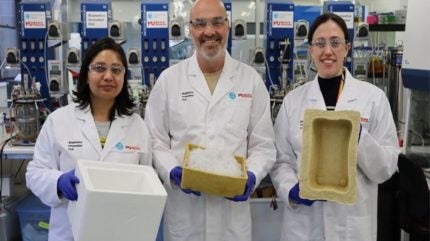
The Bioplastics Innovation Hub (BIH), a collaboration between Murdoch University and Australia’s Commonwealth Scientific and Industrial Research Organisation, has partnered with biotechnology company Cass Materials to develop biofoam seafood boxes.
The Western Australian (WA) seafood industry, which generates approximately $1bn in revenue annually, will undergo an environmental shift with the introduction of the biodegradable seafood packaging solution.

Discover B2B Marketing That Performs
Combine business intelligence and editorial excellence to reach engaged professionals across 36 leading media platforms.
This move comes as a response to the ban on expanded polystyrene (EPS) boxes in WA, which are being phased out globally due to their environmental impact. The latest boxes are used for the transportation of seafood from the ocean to the consumer.
The biofoam boxes, made from wheat straw, are designed to be fully biodegradable, addressing the urgent need for sustainable packaging solutions in the industry.
In addition to being environmentally friendly, the biofoam boxes have practical features such as being lightweight, hydrophobic, and home-compostable.
Cass Materials CEO Gary Cass said: “In WA, approximately ten million tonnes of wheat straw per year is retained on the farm and, with no tillage systems, most is burnt.

US Tariffs are shifting - will you react or anticipate?
Don’t let policy changes catch you off guard. Stay proactive with real-time data and expert analysis.
By GlobalData“With the Bioplastics Innovation Hub, we can convert this agricultural waste into new fossil-free biofoam boxes for fresh food and seafood markets.”
Conventional PS boxes can take over 500 years to decompose, contributing to landfill and microplastic pollution.
In contrast, the new biofoam boxes decompose within a few months and can enhance the organic matter content of soils. This development is timely, considering Murdoch University’s recent review that found agricultural soils contain approximately 23 times more microplastics than oceans.
BIH director Dan Murphy said: “We want to improve single-use items in the food industry by having biodegradable and compostable materials that replace things like synthetic plastics.”
The biofoam technology is currently at Technology Readiness Level 4, with laboratory prototypes validated and ready for scaling.
Cass Materials is seeking capital to scale this technology while BIH researchers are focused on developing a fully waterproof barrier to meet the final product requirements.





